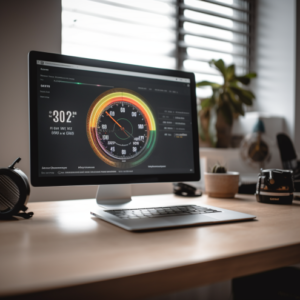In today’s digital landscape, having a website that uses speed optimization is no longer just a luxury; it’s a necessity. This is why knowledge of The Importance of Website Speed in Design needed. With users’ attention span becoming shorter, a slow-loading website can lead to poor user experience, lower engagement, and ultimately, lost business opportunities. Moreover, website speed is one of the crucial factors that Google considers in ranking search results. Hence, if you want to improve your website’s user experience and SEO rankings, it’s imperative to prioritize website speed in your design.
Understanding Website Speed and Its Impact on User Experience
Website speed refers to the amount of time it takes for a website to load fully in a user’s browser. It’s not only about how fast the website loads on your end but also how fast it loads for your users. A slow-loading website can significantly affect user experience and ultimately hurt your business. Here are some ways website speed impacts user experience:
1. Increases Bounce Rates and Decreases Engagement
When users visit a website and have to wait for a long time for it to load, they may get frustrated and leave the site. This leads to an increase in bounce rates, which refers to the percentage of users who leave a website after only viewing one page. Moreover, slow-loading websites often have lower engagement rates, as users are less likely to interact with the site’s content.
2. Reduces Conversions and Sales
In today’s fast-paced world, users expect websites to load quickly. When they encounter a slow-loading website, it can negatively affect their perception of the brand and decrease the chances of converting them into customers. In fact, studies have shown that a one-second delay in website load time can lead to a 7% reduction in conversions.
How Website Speed Optimization Affects SEO Rankings
Website speed is also a crucial factor in determining your website’s SEO rankings. Google has repeatedly stated that it considers website speed as one of the ranking factors. A fast-loading website can help improve your SEO rankings and attract more organic traffic to your site. Here are some ways website speed affects SEO:
1. Improves User Experience
Google’s primary goal is to provide its users with the best possible search experience. Hence, if your website loads quickly and offers a smooth user experience, it’s more likely to rank higher in search results.
2. Increases Crawlability
Google uses bots to crawl websites and gather information to determine their relevance and quality. A fast-loading website ensures that the bots can crawl more pages efficiently, which can help improve your website’s indexation and rankings.
3. Boosts Mobile Optimization
As more and more users access websites via mobile devices, Google has also made website speed a crucial factor in mobile optimization. A fast-loading website ensures that your site is mobile-friendly and meets Google’s mobile-first indexing criteria.
Tips for Website Speed Optimization in Design
Now that you understand the significance of website speed in design let’s look at some tips to optimize your website’s speed:
1. Optimize Images and Videos
Images and videos are often the largest files on a website, and they can significantly slow down your website. To optimize them, make sure to compress them without losing their quality. You can use image optimization tools like Kraken.io or TinyPNG to reduce the file size without affecting the image’s quality. Also, consider using lazy loading to only load images when they appear in the user’s view.
2. Minimize HTTP Requests
Each element on your website, including images, scripts, and stylesheets, requires an HTTP request to load. The more requests your website makes, the longer it takes to load. To minimize HTTP requests, make sure to remove unnecessary elements, combine multiple files, and use browser caching to load cached elements.
3. Use a Content Delivery Network (CDN)
A Content Delivery Network (CDN) helps distribute your website’s content across multiple servers worldwide. It reduces the distance between your website’s server and the user’s device, which can significantly improve website speed. Some popular CDN services include Cloudflare, MaxCDN, and Amazon CloudFront.
4. Choose a Reliable Web Hosting Service
Your web hosting service plays a crucial role in your website’s speed and performance. Choose a reliable hosting service that offers fast servers, SSD storage, and uptime guarantees. Some popular hosting providers include Bluehost, SiteGround, and A2 Hosting.
Common Factors That Affect Website Speed Optimization
Several factors can affect your website’s speed, including:
1. Large file sizes and unoptimized media
2. Too many HTTP requests
3. Poor server response time
4. Unoptimized code
5. Third-party plugins and scripts
To ensure your website’s speed and performance, make sure to address these factors and optimize your website accordingly.
Frequently Asked Questions (FAQs) about Website Speed
Q: How fast should my website load?
A: Ideally, your website should load in under two seconds. However, the faster, the better.
Q: What is a good website speed score?
A: A website speed score of 90 or above on Google’s PageSpeed Insights is considered good.
Q: How can I check my website’s speed?
A: You can use tools like Google’s PageSpeed Insights, GTmetrix, or Pingdom to check your website’s speed and performance.
Conclusion
In conclusion, website speed is an essential factor that affects user experience and SEO rankings. By optimizing your website’s speed, you can enhance user engagement, boost conversions, and attract more organic traffic. Make sure to follow the tips outlined in this article, address the common factors that affect website speed, and monitor your website’s speed regularly to ensure it meets the industry’s standards. Remember, a fast-loading website is crucial for your online success, so prioritize website speed in your design. Contact us for more information.





